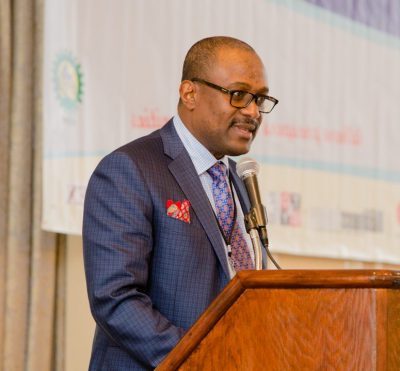
Hannington Osodo
Nairobi, Kenya — In April 2010 Nigeria enacted a new piece of legislation that changed the country’s oil and gas industry and possibly the country’s wider economy forever.
The Act, known as the Nigerian Oil and Gas Industry Local Content Development Act or the NOGICD Act, was enacted to change decades of foreign domination of Nigeria’s multi-billion-dollar oil and gas sector.
Oil has driven Nigeria’s $600 billion economy since it was first discovered in the Niger Delta region in the 1950s and commercially exploited. Despite more than 50 years of extraction, the real benefits remained elusive to average Nigerians with doors to the industry shut and closely guarded by the international oil and gas giants.
Simbi Wabote, the Executive Secretary Nigerian Content Development and Monitoring Board (NCDMB), is convinced that the Act will transform the oil and gas sector – the biggest foreign exchange earner in Africa’s top oil producer – and be an example across the continent for other resource-rich countries to emulate.
An engineer by training and a former director of Shell Nigeria, Wabote leads the board that is overseeing the implementation of the Act.
“Our aim is that by 2027, based on our strategic plans, we will be at 70% of local content. We are working at it to see that we get there, hoping that all the variables including power, road infrastructure and the continuous growth and investment that we expect in the oil and gas sector remains stable and grows,” he said.
“Before the enactment of the Act, all production activities were in the hands of the International Operating Companies, the IOC’s, they managed the operations, the Shells, Chevrons, Exxons…” he added.
Together with a highly competent team, Wabote has been responsible for the remarkable transformation in the oil and gas sector that now sees Nigerian companies providing cutting-edge services and equipment to the IOC’s and also to local companies.
“All engineering design – conceptual, front end, detailed design, were done outside the country. But today as we speak, eighty percent of all engineering design is done in the country, which is an amazing achievement. Can you imagine the capital flight when we did all those kinds of designs outside the country?” said Wabote.
On April 22, this year, amid the global coronavirus lock down, the Nigerian oil and gas industry marked a decade’s worth of achievements and a record transformation not seen anywhere in Africa.
The implementation of the NOGICD Act, has opened opportunities for Nigerian companies such as AITEO, AVEON, DELTAFRIK, LADOL, OILSERVE, NESTOIL and many others that today constitute a block of indigenous companies that contributes to the bulk of oil and gas related services in the country.
“Before the act was enacted the local content percentage in the local industry was less than 5%, so between 2010 and 2015 we moved it to about 25% in terms of the growth of local content, but today it’s about 30%,” said Wabote.
From ship building, oil rig fabrication and maintenance, oil well drilling to the laying of giant oil pipes in swampy terrain or in the sea, these companies have proven their excellence to the IOC’s.
Many Nigerian companies now own drilling rigs and ownership of sea going vessels has jumped to 40% from near zero a few years ago.
Momentous flagship projects since the enactment of the NOGICD Act in 2010 include Egina, a multi-billion-dollar giant complex Floating Production Storage and Offloading vessel – FPSO.
Egina’s hull and other primary parts were assembled at the Samsung Heavy Industry’s Yard in South Korea, but the rest of the cutting-edge fabrications and installations were carried out in Nigeria by Nigerian companies among them LADOL and AVEON.
Dr. Amy Jadesimi, the Managing Director Lagos Deep Offshore Logistics Base – LADOL, said the new Act has been a resounding success.
“It’s been a triumph for local content, and we have created 3,000 jobs so far. Going forward we expect to create 50,000 jobs directly or indirectly due to the multiplier effect of what we do at LADOL,” she said.
Today, a total of five cutting-edge welding yards operate in Nigeria fabricating about 60,000 metric tons per annum.
The NCDMB aims to create more than 300,000 direct jobs through its activities and also retain as much as $17 billion in-country of the $20 billion of the estimated annual industry spend.
Before the Act – Taking the bull by the horns.
However, even before 2010, without the full support of the law, a few Nigerians had forced their way in into the oil and gas industry. Many had first-hand experience working with IOC’s and recognized the vast potential the underserved Nigerian industry represented.
One such group formed by Nigerian oil and gas executives looking to build Nigerian capacity was PETAN or the Petroleum Technology Association of Nigeria, led by Bank-Anthony Okoroafor based in the commercial capital Lagos.
“Most of us worked for multinational companies all over the world, so we came up together… let’s do same service for Nigeria, for the betterment of Nigerians, to help Nigerians create more entrepreneurs, retain more value in-country and create more employment and opportunities for Nigeria. That’s why more than 20 years ago, we set up PETAN,” said Okoroafor.
But despite the best efforts by these pioneer firms, the vast majority of service operations remained firmly in the hands of IOCs until the NOGICD act came into law.
“By the time we set up, in total, more than 380 billion dollars had walked away from the country,” said Okoroafor.
Another executive who also had first-hand experience providing services to IOCs in those early days is Ernest Azudialu Obiejesi, popularly known as Obijackson. He founded Nigeria’s foremost indigenous oil and gas company, Nestoil.
“It was a question of who the IOCs like. If they like your face, they give you the job. They don’t like your face, you are gone,” he said.
Today, Nestoil is one of the companies laying one of the biggest pipelines in the country for Shell Nigeria. Their success has already won them the title: “kings of the swamps.”
Overcoming early challenges
Although 10 years later the NCDMB is riding on a high note of success, it would be misleading to assume the transformation in the Nigerian oil and gas sector happened overnight.
One of the biggest challenges that indigenous firms faced in the initial stages was lack of trust by IOCs.
“The biggest challenge was a question of trust and perception on the ability of a Nigerian-owned yard to provide the kind of services that were needed,” said Tein George, Chairman Aveon Offshore.
Dr Emeka Okwuosa, Group Chief Executive Oilserv concurred.
“First, there was a narrative that Nigerians could not do it, second there was a narrative that oh…you guys, some of you have worked with the companies, we know you have capacity individually but you don’t have a system in place, we cannot entrust delicate operations to the hands of untested companies,” he said.
Ernest Nwapa, a former Executive Secretary of the NCDMB, also remembers some of the malpractices by certain IOCs operating in the Niger Delta at that time.
“Oil companies used to give people work and tell them to go and sit at home. So, they would come and claim that ‘I’ve employed 20 people from the community, but we don’t have space for them to work, so we just pay them at the end of the month’…that is damaging to humanity,” he said.
It was automatically clear something more substantial had to be done to correct the situation.
Engineer Wabote said it took a lot of skillful negotiations and convincing for the world’s giant oil corporations to comply with, not only to the letter but also to the spirit of the transformative NOGICD act.
“One watchword in the implementation of the local content is PRAGMATISM, you have to be pragmatic in your approach and not be dogmatic about it…if you read the act like a holy book, you’re probably not going to make any progress,” he said.
“I think it was a jolt for them. When we told them listen, there’s a law you have to abide by the law and some of these thing you have to do in the country, they were a bit taken back because as you know, there are those people who are always afraid of change, especially when there is so much uncertainty. So that uncertainty really upset them a bit,” he added.
As the NCDMB progressed in its transformative work, some of the challenges required that the board to step out beyond the oil and gas industry, reaching out to other sectors, including academia.
“We have launched a 10-year roadmap for R&D, we’ve set up a research and development council which will be substantial enough to support the academia because we’ve become the nexus of between the industry and academia,” said Wabote.
The board has also set aside a $200 million fund to assist Nigerian entrepreneurs bridge any financial gap that may arise in their projects.
Moving forward
A trip down to the various busy expanse fabrication yards and docks in the oil hub of Port Harcourt Lagos and Yenagoa clearly confirm that the local content Act has had a huge impact on Nigeria’s oil and gas industry.
But in the face of weakening oil prices, a move to cleaner energy in some parts of the world and as the Nigerian oil basin matures, where will the country go from here? Will the IOCs continue to support the local content Act?
Those in the Nigerian oil and gas industry say the situation is challenging but far from bleak.
“For Africa, it’s going to take time for us to get into that fully fledged green energy, so our oil and gas will continue to be relevant. I believe gas will be more relevant because it is cleaner,” said Aki Adumakinde, Chief Executive Deltafrik.
Ojunekwu Augustine Avuru, Chief Executive Seplat, sees more opportunities in the maturing Nigerian oil basin should the IOCs decide start cutting back on their investments.
“The difference is that, Nigerian independents are available to fill the gap, rather than for the country to wait for other multinationals to come in. So, the future of oil and gas industry belongs to Nigerians and Nigerian independents,” he said.
Lessons for the rest of Africa
Historically, resource rich countries in Africa have been associated with high levels of corruption, poverty, violence and low growth.
Nigeria might be a long way from clearing some of these hurdles and empower its people. But plans are already under way to further the influence of the transformative NOGICD Act into all sectors of its economy.
“Already there is a push for a law to expand the scope of local content to other major sectors of the country,” said Timipre Sylva, Nigeria Minister of Petroleum.
Nigerian indigenous companies are proud to be associated with the NOGICD Act and hail it as being unique to Nigeria.
“Look around Africa, apart from national companies that you may find thriving in part of North Africa, there is nowhere else in Africa you see the depth of indigenous participation both in the upstream in terms of actual exploration, development and production of gas and crude oil. Nowhere in Africa would you find what you find in Nigeria,” said Ojunekwu Augustine Avuru CEO Seplat.
“The Nigeria content Act is the pride of Africa, frankly, we have perhaps the most certain local content regulations in Africa. The laws are very clear, the board has done an outstanding job, they’ve enforced the law, they’ve been pragmatic, they’ve been fair, they have been reasonable,” said Tein George Chairman Aveon Offshore.
Empirical evidence on the ground today shows that if the transformative Nigeria’s oil and gas industry local content Act is allowed to run its course successfully, it could provide a roadmap for other resource rich African countries to also transform their economies.



